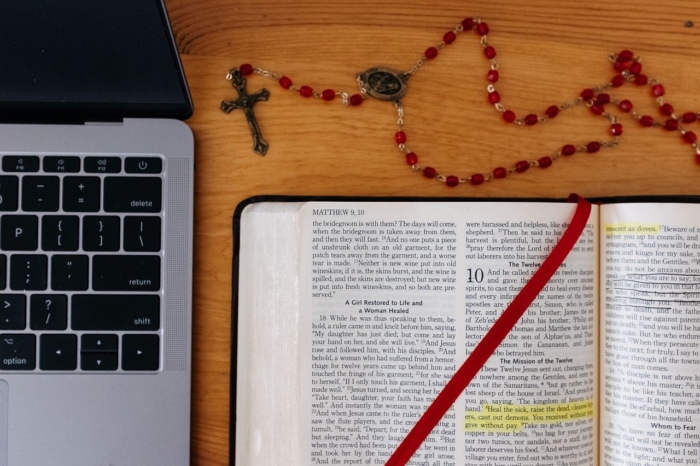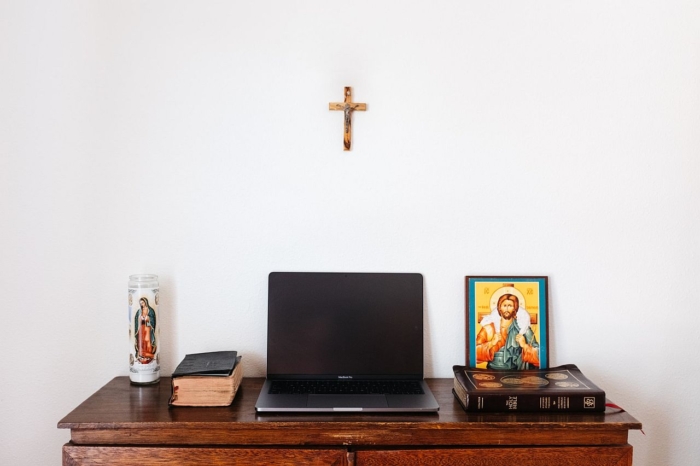With church doors locked and confession booths closed during the COVID-19 pandemic, many Christians turned to the internet to feed their spiritual needs. At the same time, pastors and priests worked hard to take their congregations online.
What church leaders and congregants alike have found is a flourishing online Christian community full of Facebook worshippers, prayer apps, and fully digital churches. In other words, the concept of an online church was established well before the current pandemic. That said, it may become significantly more mainstream as a result of the stay-at-home orders.
Are you ready for the digital future of religion? Here’s everything pastors and churchgoers need to know.
What is an online church?
Before we go any further, let’s clear up what an online church is.
In the opinion of John C. Dyer, Ph.D., dean of enrollment and distance education and adjunct professor of media arts and worship at Dallas Theological Seminary, an online church is one that uses two-way communication to interact with members.
“This could be as simple as a comment stream on Facebook moderated by church staff,” he writes. “But it can also refer to individuals in a faith community connecting in chat rooms or using video conferencing software like Zoom to have a small group meet.”
Jay Kranda, an online campus pastor at Saddleback Church, says an online church is more than a broadcasting tool. It should focus on three areas: “online sermons, small groups, and online classes.”
A church doesn’t have to be fully digital to be considered an online church. There are plenty of physical churches that have a significant online component. Megachurches have proved particularly adept at using the internet to expand their reach.
“Joel Osteen’s Lakewood Church drew in 4.51 million viewers, more than when Kanye West visited last year,” reports Christianity Today’s Kate Shellnutt. “Greg Laurie’s Harvest Fellowship had over 230,000 devices tuned in to its Harvest at Home service on Sunday, and celebrated over 1,400 online commitments.” While Judah Smith’s Churchome had to close its physical Seattle and Los Angeles locations, people flocked to the church’s online services, and attendance doubled.
Just because your church isn’t a megachurch doesn’t mean you can’t offer online worship services. According to Thom S. Rainer, the founder and CEO of Church Answers, online congregations used to be reserved for only the biggest churches. With free online platforms like Facebook, however, any church can have a digital presence as long as they have an internet connection.
Just so you know
Collect donations, e-signatures, and information for your online church with Jotform’s easy-to-use form software.
Online churches are more popular than ever
Because of the coronavirus pandemic, more people have flocked to online churches, and more churches have moved online than ever before.
It’s extremely important for the church to be available and connected in these difficult times, says Bobby Gruenewald, a pastor and innovation leader at Life.Church. “While hospitals meet physical needs, the church needs to keep its doors open, digitally, to meet spiritual and emotional needs — especially during social distancing.”
Church leaders everywhere are responding to the need. The Church Online platform, which is part of the Life.Church Open Network, saw more than 6,000 churches sign up in just one week in March.
William Vanderbloemen, Founder of the Vanderbloemen Search Group, says that online platforms aren’t just a nice-to-have option for churches anymore: “They are the new norm, particularly for very large churches.” He points to platforms like FreeOnlineChurch.com “to help normal-sized churches immediately plug in their services to an existing platform.”
It’s not just the pandemic that makes online churches appealing
Many churchgoers are turning to online churches now because they can’t attend their local church in person. But online churches have long been popular for several other reasons.
One is the “the allure of connecting online rather than face to face,” says business writer Andrew Conrad at Capterra. It also provides a way for churches to connect with those unable to attend services in person “due to illness, disability, or distance.”
This is the case for Emma Major, a licensed lay pioneer minister at St Nicolas’s in Earley, U.K., who is blind. People with vision issues have always had difficulty fully participating in services because these services often rely on a lot of visual tools, such as hymnals. Similarly, people with other disabilities have a restricted experience in traditional places of worship. The internet, on the other hand, is much more inclusive.
Online churches may also appeal to those who would never think of setting foot in a cathedral or participating in a typical faith community, says Jim Daly, president of Focus on the Family. “In the last few days, I’ve seen evidence of churches putting a renewed emphasis on promoting their online worship platforms — and that’s bound to attract those curious who may be searching for something different and more meaningful.”
For pastor Carey Nieuwhof, the appeal of online churches lies in their convenience. His church streams services live and shares them on demand and via podcast, allowing church members to watch or listen to services anywhere at any time. If his church didn’t have services online, he says it wouldn’t matter because so many other churches do.
How to take your church online
If you want to remain relevant during the pandemic and beyond, taking your church online is essential. The good news is that doing so doesn’t have to be hard, says Catalyst Creative’s Russ Cantu. Using Facebook and YouTube to stream sermons is a great way to get your message out quickly if you have a small budget.
Don’t stop at streaming, though. Vintage Faith Church’s Jay Kim, author of Analog Church, encourages conversation between pastors and their congregation because these conversations “can help to bridge the digital divide by inviting those viewing online to not only lend their eyes and ears, but also their thoughts, insights, and questions.” What’s more, they give the sense that church is a live event where people gather at a particular time, even if they aren’t in the same room.
Douglas Estes, an associate professor of New Testament and Practical Theology at South University, recommends creating a community rather than worrying about the technology. This is what a real church is made of, not the technology platform it’s hosted on or the building it inhabits.
It’s important your online church makes physical connections, says Jeff Reed, owner of TheChurch.Digital. “Empower others to start watch parties, microsites, house churches… whatever you want to call them…. A healthy church online isn’t just a virtual broadcast watched on an iPhone, but a method of gathering people in physical spaces,” he writes.
You’ll need a team to help, too, advises Sly King, online campus pastor at The Worship Center Christian Church in Alabama. “Look for volunteers who have a heart to serve and desire to make a difference for Christ by praying and chatting online each week with those who attend church online,” he says.
Invest time in your congregants’ online education, too. Teach them how to use the platform, how an online church is different, and what you need to do collectively to succeed.
Finally, taking online donations is essential, writes digital strategist Steve Fogg. The coronavirus has impacted church giving, especially those that rely on cash, so encourage members to create recurring online donations.
Online churches may never completely replace the spirit and community of traditional places of worship, but their relevance in the current climate can’t be denied. Going forward, every church that wants to keep a connection with its congregation should be at least somewhat online, even if most churchgoers still prefer to meet every Sunday in person.
Images by: Dylan Ferreira, Grant Whitty























Send Comment:
1 Comments:
More than a year ago
This is a very helpful guide. Thank you! Will be sharing this with my pastor with my pastor at rch/ so that together, we can build a stronger online church presence and be counted as one of the best online churches there is.